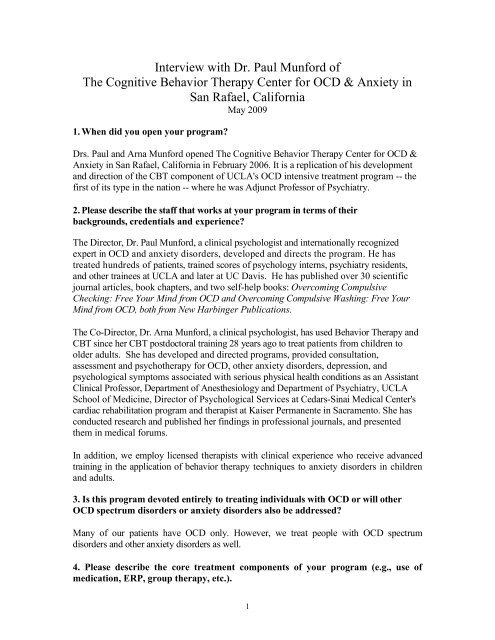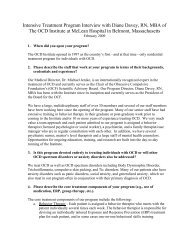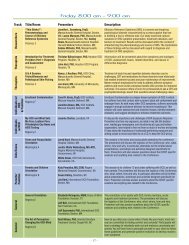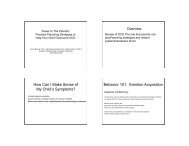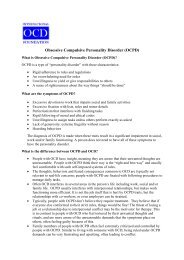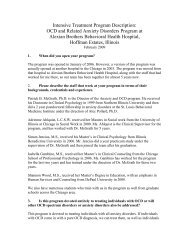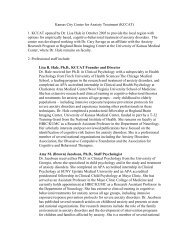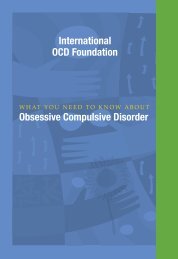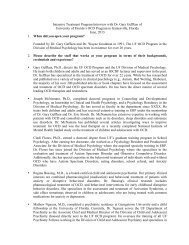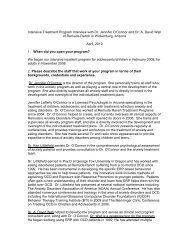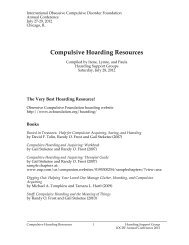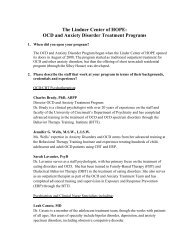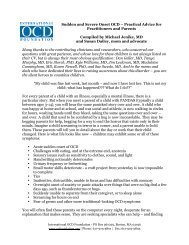Interview with Dr. Paul Munford of The Cognitive Behavior Therapy ...
Interview with Dr. Paul Munford of The Cognitive Behavior Therapy ...
Interview with Dr. Paul Munford of The Cognitive Behavior Therapy ...
- No tags were found...
You also want an ePaper? Increase the reach of your titles
YUMPU automatically turns print PDFs into web optimized ePapers that Google loves.
<strong>Interview</strong> <strong>with</strong> <strong>Dr</strong>. <strong>Paul</strong> <strong>Munford</strong> <strong>of</strong><br />
<strong>The</strong> <strong>Cognitive</strong> <strong>Behavior</strong> <strong>The</strong>rapy Center for OCD & Anxiety in<br />
San Rafael, California<br />
May 2009<br />
1. When did you open your program<br />
<strong>Dr</strong>s. <strong>Paul</strong> and Arna <strong>Munford</strong> opened <strong>The</strong> <strong>Cognitive</strong> <strong>Behavior</strong> <strong>The</strong>rapy Center for OCD &<br />
Anxiety in San Rafael, California in February 2006. It is a replication <strong>of</strong> his development<br />
and direction <strong>of</strong> the CBT component <strong>of</strong> UCLA's OCD intensive treatment program -- the<br />
first <strong>of</strong> its type in the nation -- where he was Adjunct Pr<strong>of</strong>essor <strong>of</strong> Psychiatry.<br />
2. Please describe the staff that works at your program in terms <strong>of</strong> their<br />
backgrounds, credentials and experience<br />
<strong>The</strong> Director, <strong>Dr</strong>. <strong>Paul</strong> <strong>Munford</strong>, a clinical psychologist and internationally recognized<br />
expert in OCD and anxiety disorders, developed and directs the program. He has<br />
treated hundreds <strong>of</strong> patients, trained scores <strong>of</strong> psychology interns, psychiatry residents,<br />
and other trainees at UCLA and later at UC Davis. He has published over 30 scientific<br />
journal articles, book chapters, and two self-help books: Overcoming Compulsive<br />
Checking: Free Your Mind from OCD and Overcoming Compulsive Washing: Free Your<br />
Mind from OCD, both from New Harbinger Publications.<br />
<strong>The</strong> Co-Director, <strong>Dr</strong>. Arna <strong>Munford</strong>, a clinical psychologist, has used <strong>Behavior</strong> <strong>The</strong>rapy and<br />
CBT since her CBT postdoctoral training 28 years ago to treat patients from children to<br />
older adults. She has developed and directed programs, provided consultation,<br />
assessment and psychotherapy for OCD, other anxiety disorders, depression, and<br />
psychological symptoms associated <strong>with</strong> serious physical health conditions as an Assistant<br />
Clinical Pr<strong>of</strong>essor, Department <strong>of</strong> Anesthesiology and Department <strong>of</strong> Psychiatry, UCLA<br />
School <strong>of</strong> Medicine, Director <strong>of</strong> Psychological Services at Cedars-Sinai Medical Center's<br />
cardiac rehabilitation program and therapist at Kaiser Permanente in Sacramento. She has<br />
conducted research and published her findings in pr<strong>of</strong>essional journals, and presented<br />
them in medical forums.<br />
In addition, we employ licensed therapists <strong>with</strong> clinical experience who receive advanced<br />
training in the application <strong>of</strong> behavior therapy techniques to anxiety disorders in children<br />
and adults.<br />
3. Is this program devoted entirely to treating individuals <strong>with</strong> OCD or will other<br />
OCD spectrum disorders or anxiety disorders also be addressed<br />
Many <strong>of</strong> our patients have OCD only. However, we treat people <strong>with</strong> OCD spectrum<br />
disorders and other anxiety disorders as well.<br />
4. Please describe the core treatment components <strong>of</strong> your program (e.g., use <strong>of</strong><br />
medication, ERP, group therapy, etc.).<br />
1
<strong>The</strong> core treatment is exposure and response prevention (ERP) used either separately or in<br />
combination <strong>with</strong> medications. All exposure activities are developed mutually between the<br />
therapist and the patient who is never coerced to engage in activities he or she does not<br />
wish to do. Similarly we never ask patients to make contact <strong>with</strong> any potentially dangerous<br />
or unnecessary activities such as those they may have seen on television or read about (e.g.<br />
having physical contact <strong>with</strong> public garbage cans and public bathroom floors).<br />
We also provide education about OCD and training in problem solving, social skills,<br />
assertiveness, relaxation, and stress management.<br />
5. Please describe the treatment planning process at your program.<br />
All those seeking treatment are interviewed in our facility or by telephone, if they do not<br />
live locally, to determine whether we provide the treatment they require. Patients who<br />
are admitted receive an in depth evaluation by means <strong>of</strong> interviews and written<br />
assessments. This includes completing the Survey <strong>of</strong> Obsessions and Compulsions for<br />
OCD (SOC-OCD) (copyright by <strong>Paul</strong> R. <strong>Munford</strong>, Ph.D.) and the Yale-Brown Obsessive<br />
Compulsive Scale (Y -BOCS) Severity Ratings. Screening for other mental disorders is<br />
completed by administering the Brief Symptom Inventory (BSI). Adults' personal and<br />
family histories are obtained by administering the Personal History Checklist for Adults.<br />
And finally, the patient or parent completes a form that provides information on their<br />
educational and/or vocational status, medical history, and current family and social<br />
relationships. Data from these and other instruments and interviews are used to identify the<br />
content <strong>of</strong> the patients’ obsessions and identify triggers for them so exposure and ritual<br />
prevention exercises can be developed. Assessment and evaluation continue daily<br />
throughout the program to guide treatment and assess progress.<br />
6. If someone has a co-morbid condition, can he or she participate in your program<br />
Will there be treatment for the co-morbid condition If so, can you give an<br />
example<br />
People <strong>with</strong> co-morbid conditions can participate in our program. For example, we have<br />
made the initial diagnosis and successfully treated a number <strong>of</strong> OCD patients <strong>with</strong><br />
Asperger’s Syndrome and ADHD. Following significant reduction in their OCD<br />
symptoms we referred them to appropriate resources to address their other disorders. We<br />
have also found that social anxiety disorder is a frequent co-morbid condition <strong>with</strong> OCD.<br />
We address this condition by means <strong>of</strong> social skills training, assertiveness training, and<br />
gradual exposure to the social situations that trigger avoidance and anxiety.<br />
7. Are parents, family members, friends, teachers, etc., included in the treatment If<br />
yes, please describe how.<br />
We encourage patients to consent to having family members and significant others<br />
involved in their treatment. We teach family how to reinforce their loved ones completion<br />
<strong>of</strong> exposure exercises by praising their efforts while refraining from the use <strong>of</strong> coercion to<br />
eliminate any practices that maintain OCD symptoms such as accommodating the patient<br />
to avoid triggers for obsessions or assisting them <strong>with</strong> rituals. In most cases, patients<br />
repeatedly ask others for reassurance that their obsessional fears will not materialize.<br />
2
<strong>The</strong>se incessant requests become rituals and thereby block exposure. Thus we instruct all<br />
the parties involved to stop this maladaptive form <strong>of</strong> support and instead provide praise<br />
for the hard work that the patient is doing. In cases where the patient's OCD symptoms<br />
are a source <strong>of</strong> conflict <strong>with</strong>in the family we provide family counseling to resolve these<br />
interpersonal problems.<br />
8. How <strong>of</strong>ten do patients in the program meet <strong>with</strong> staff individually How long are<br />
these individual sessions<br />
Patients meet <strong>with</strong> staff individually on an ongoing basis throughout each day, except when<br />
a patient is practicing ERP alone after practicing exposure <strong>with</strong> the therapist. During our<br />
three to four hour program, patients usually have individual staff contact for about three<br />
hours.<br />
9. Is there a set time period for a patient's treatment in the program What is the<br />
overall time commitment to the program (for example, attend daily for three weeks)<br />
How much flexibility is there in extending someone's stay, if needed<br />
<strong>The</strong>re is no set time period for the program. However patients are informed that it usually<br />
takes from four to six weeks to reach their goals <strong>of</strong> reducing their symptoms to mild or low<br />
- moderate levels <strong>of</strong> severity for discharge to outpatient treatment. If additional time is<br />
needed, it will be provided. Some patients reach theirs goal in less time and are<br />
discharged sooner.<br />
10. Is there a homework or "self directed" component to the treatment<br />
Yes, daily homework is an important component <strong>of</strong> the treatment because it allows the<br />
patient to practice self directed ERP in their home and community, thus generalizing<br />
the desensitization they experience in the Center to triggers for OCD found in everyday<br />
life.<br />
11. Please describe the relapse prevention strategies you use in your program.<br />
As treatment progresses patients assume more input in designing the exposure<br />
exercises. If symptoms intensify or return after discharge, they will know how to set up<br />
exposure exercises as needed. In addition, given that stress can trigger the return <strong>of</strong><br />
symptoms or exacerbate them, we provide information on stress management techniques,<br />
relaxation training, and the necessity for engaging in pleasant events.<br />
12. What kind <strong>of</strong> follow-up do you do for those who complete your program Will<br />
the members or your treatment team be in contact <strong>with</strong> or willing to consult<br />
<strong>with</strong> the individual's regular treatment provider(s)<br />
Some patients will be followed up by our staff by means <strong>of</strong> weekly outpatient treatment<br />
sessions to consolidate the gains they have made during their intensive treatment. For<br />
those returning to their referring providers, we <strong>of</strong>fer them information on the patient's<br />
intensive treatment and consultation on their continued outpatient treatment if it is<br />
requested. For those <strong>with</strong>out an outpatient therapist, we provide referrals to competent<br />
OCD therapists. Patients are also encouraged to contact us at any time if they have any<br />
3
questions or concerns, or just to let us know how they're doing, which many <strong>of</strong> them do.<br />
13. Do you <strong>of</strong>fer a sliding fee scale or scholarships for those who cannot afford<br />
your program<br />
We do not currently <strong>of</strong>fer a sliding fee scale or scholarships because it is not fiscally<br />
possible. We already spend many hours outside <strong>of</strong> clinic time at no fee working <strong>with</strong><br />
insurance companies to cover treatment costs and finding community resources to<br />
promote patients' continued progress after discharge from our program.<br />
14. Does your program only work <strong>with</strong> individuals who are local or are there<br />
arrangements for those who come from farther away (for example, lodging<br />
arrangements)<br />
Our program works <strong>with</strong> individuals who live locally and farther away. We help those<br />
who live beyond commuting distance to find nearby lodging that suits their budget and<br />
lifestyle. Because our program is an outpatient program, we feel it is ethically important<br />
for housing arrangements to be provided by business entities completely separate from our<br />
Center in order to avoid any conflict <strong>of</strong> interests or dual relationships.<br />
15. Please add any information you think would be helpful in describing the<br />
unique aspects <strong>of</strong> your program if this has not been covered in the questions<br />
above.<br />
<br />
<br />
<br />
<br />
As a result <strong>of</strong> the Mental Health Parity Act we are able to contract <strong>with</strong> most<br />
insurance companies to cover most or all <strong>of</strong> the cost <strong>of</strong> our treatment<br />
<strong>The</strong> Center is in beautiful downtown San Rafael, California (just 20 minutes<br />
north <strong>of</strong> San Francisco) which <strong>of</strong>fers many nearby opportunities for exposure<br />
therapy exercises and for recreation. We are close to public transportation<br />
which <strong>of</strong>fers easy access to many San Francisco Bay attractions. <strong>The</strong> Center<br />
itself is tastefully decorated and has large rooms <strong>with</strong> views <strong>of</strong> the<br />
surrounding hills that engender feelings <strong>of</strong> serenity. We are frequently<br />
complimented on our supportive, comfortable, attractive environment.<br />
To evaluate the effectiveness <strong>of</strong> our treatment program, we used the Yale-Brown<br />
Obsessive Compulsive Scale (Y-BOCS) Severity Ratings to compare the severity <strong>of</strong><br />
30 OCD patients' symptoms before treatment and at the end <strong>of</strong> treatment, which<br />
generally took four weeks. <strong>The</strong> average score before treatment was 27, which is in the<br />
severe range <strong>of</strong> intensity. After treatment, their average score was 13, which is in<br />
the mild range. This change means that our treatment resulted in an average decrease<br />
in symptom intensity <strong>of</strong> 52%, which is progress enough to allow them to function<br />
normally. Also, 83% <strong>of</strong> patients who completed the Brief Symptom Inventory rated<br />
their general psychological distress in the severe range before treatment and <strong>with</strong>in<br />
normal limits after treatment.<br />
<strong>The</strong> improvements shown by the changes in pre and post treatment data are gratifying.<br />
4
However, our greatest reward is from patients who tell us they have achieved clarity <strong>of</strong><br />
mind and freedom from rituals, and from their family and friends who thank us for<br />
giving them back their loved ones.<br />
5


